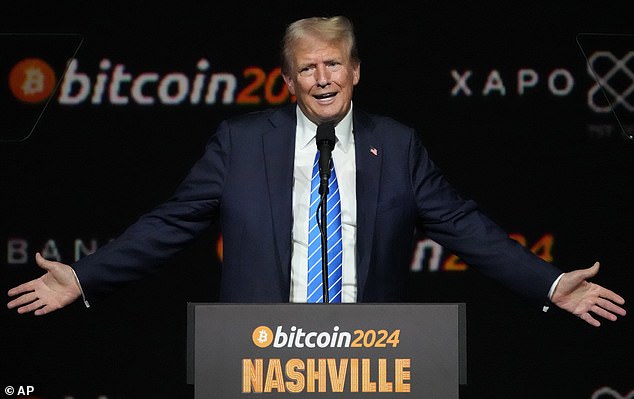Bitcoin is hitting new all-time highs once again and is up by close to 50 per cent in the last year alone.
The price of the cryptocurrency reached a record $112,000 (£82,700) on May 22, and many believe it has far further to run – although this is far from a given and its most vertiginous falls often follow hot on the heels of the biggest rises.
So, if you’ve been standing on the sidelines is now a good time to jump on the Bitcoin bandwagon – or have you left it too late? Experts share their predictions – and their theories on why Bitcoin is having such a good run.
Why is Bitcoin rising in price?
Bitcoin has been performing well since Donald Trump, who is notoriously supportive of cryptocurrency, was named President of the United States.
During his election campaign, he pledged to make the US the ‘crypto capital of the planet’ and in recent weeks has taken further steps to show his commitment.
Promised regulation of cryptocurrency is starting to take shape in the US, which means more investors are beginning to take it seriously.
The Genius Act is making its way through the US senate in a move to regulate so-called stablecoins, a form of digital currency that is designed to be less volatile as it is pegged to the value of another asset such as the US dollar or gold.
Reports this week have also suggested that President Trump’s social media firm, Trump Media & Technology Group, plans to raise around $3 billion (£2.2 billion) to spend on cryptocurrencies such as Bitcoin, although the President denied this is the case.

Bitcoin has been performing well since Donald Trump, who is notoriously supportive of cryptocurrency, was named President of the United States
The new funding could be announced this week at a large meeting of cryptocurrency investors in Las Vegas, the Financial Times reported.
The price of Bitcoin had fallen back in the wake of President Trump’s tariff announcements, as nervous investors sought safety in less volatile assets. But as confidence has returned, so have Bitcoin investors.

Sarah Coles works for wealth manager Hargreaves Lansdown
Sarah Coles, from the wealth manager Hargreaves Lansdown, says: ‘It also helps that some of the heat has come out of the tariff drama, while everyone pauses for breath. In that kind of environment, enthusiasm for riskier assets tends to build.’
Growing numbers of large investors, such as companies and firms that invest on other people’s behalf, have been buying Bitcoin, which has helped to push up the price. Funds that allow investors to track the price of Bitcoin are also bringing fresh interest. These funds, called spot Bitcoin exchange-traded funds, were approved for sale in the US last year, but are not available to UK investors.
Simon Peters from the trading platform eToro, says: ‘Spot Bitcoin exchange-traded funds, which track the price of the cryptocurrency, brought in more than $2.5 billion (£1.8 billion) last week, and listed companies continue to buy and hold it, now accounting for about 4 per cent of the total supply.’
Could it rise further still?
Increasing interest from professional investors could mean this rally has further to run. Huge companies such as Tesla and MicroStrategy now hold Bitcoin on their balance sheets, says Laith Khalaf at the wealth manager AJ Bell, and the first UK pension scheme has reportedly invested in it. ‘Some large investors are still entering the market, which some see as a sign of confidence, but caution is always advised,’ adds Mr Peters.
Predictions vary wildly on where Bitcoin could be headed next. This is understandable – the cryptocurrency is hugely volatile, is affected by economic factors as well as human sentiment, and no one can know for sure which way it is headed.

Simon Peters, from the trading platform eToro
That’s why financial experts suggest that you should only invest money that you can afford to lose and that if you hold some, cryptocurrencies should only ever form a small fraction of your investment portfolio. Cryptocurrency is currently unregulated in the UK so you have little consumer protection if something goes wrong.
Ms Coles at Hargreaves Lansdown warns that it’s impossible to second guess what the next announcement from the White House will be and what impact it will have on people’s faith in cryptocurrencies.
‘Given that we’ve seen wild swings in prices based on a single tweet, nobody should try to convince themselves this is a sensible and considered investment strategy based on analysis,’ she says. ‘It is a gamble, which you should only consider for the fringes of your portfolio with money you’re prepared to lose.’
Bitcoin tends to fall sharply after strong periods of performance. Between December and April it fell 30 per cent from about $106,500 (£78,800) to $75,000 (£55,500) amid concerns about rising inflation. One of its biggest downturns was between November 2021 and December 2022 when the price crashed almost 75 pc from about $68,000 (£50,000) to just $18,000 (£13,000).
Nic Puckrin, founder of The Coin Bureau, thinks the current rally looks more sustainable than previous ones and that Bitcoin could quickly reach $120,000 (£89,000) from its current level, and $150,000 (£111,000) longer-term.
Jackson Wong from the Good Money Guide, cautions that as Bitcoin’s total market value is now $2 trillion, it would take a significant amount of new investment to double its price. ‘The next target is the round number of $120,000 or $125,000. Prices could overshoot to $150,000, but to reach $200,000 would require plenty of FOMO buying [fear of missing out],’ he says.
Gabriel McKeown, from the investment newsletter Sad Rabbit, thinks the future of Bitcoin will be shaped by the monetary policy of the US central bank, the Federal Reserve and where large investors decide to put their money. ‘On the upside, a Bitcoin price exceeding $500,000 (£370,000) is feasible, but on the downside, I can still see a world where it falls below $30,000 (£22,000),’ he says.
David Belle, a trader and founder of Fink Money, is among the more confident cryptocurrency experts. He thinks the Bitcoin price could reach $1 million (£839,000) within the next ten years. ‘Yes Bitcoin is volatile, but over a longer period of time, there aren’t many better investments,’ he says.
What are the alternatives to crypto?
Thomas Becket from the wealth manager Canaccord suggests that if you are looking to spread your risk by investing in a variety of assets, there are plenty of options that may be less risky than cryptocurrency.
‘I might be considered old fashioned but, in today’s uncertain world, I am more comfortable holding some exposure to either gold or commodities as a way to diversify,’ he says.
As for whether any other cryptocurrencies could follow Bitcoin’s upward march, he is sceptical. ‘There are other coins with apparent utility, however they don’t benefit from the name recognition and historical context that Bitcoin has,’ he says. ‘The real contenders will be government-issued coins. But, for now, if one is going to speculate on crypto, you might as well pick the most prominent version.’
Mr Puckrin agrees that Bitcoin is the ‘gold standard’, arguing that so-called altcoins (alternative coins) are ‘much more volatile and risky’. Two potential alternatives he does like are SUI which ‘has gained a lot of traction over the past year’ and Hyperliquid whose HYPE token ‘has been incredibly resilient over the past few months’.
Meanwhile, Mr Belle thinks the Solana price could move higher, with investors attracted by its lower transaction costs. Tony Redondo, founder of Cosmos Currency Exchange, names Ethereum, Solana and XRP as possible alternatives for investors looking for something away from Bitcoin.
Mr Peters suggests Ether and Solana as two of the biggest alternatives. Ether is down 36 per cent over the past year and currently trades at £1,877, Solana is up about 8 per cent to $178 (£131) over the past year, but there have been some volatile ups and downs over that period.
It is important to do your research before buying any crypto asset as some are more legitimate than others. So-called meme coins, which are often created as a joke, can trade for fractions of pennies and are often incredibly volatile.
Another option is to invest in a fund that holds companies involved in the crypto sector. For example, the Invesco Coinshares Global Blockchain ETF tracks 50 stocks including Coinbase, a crypto trading platform, the chipmaker Taiwan Semiconductor, and MetaPlanet, a Japanese investment company with a large Bitcoin stake. The fund has returned 16.5 per cent over the past year.












